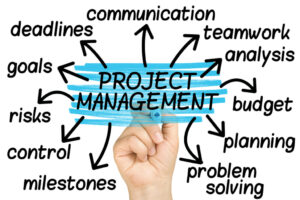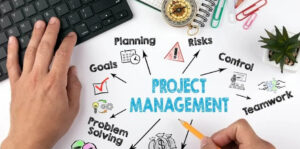Project Management Training Programs: Elevate Your Project Leadership

Are you looking to take your project leadership skills to the next level? Project management training programs can help you elevate your abilities and become a more effective and efficient project manager. These programs provide you with the necessary tools and techniques to successfully lead projects from start to finish.
Effective communication strategies are essential for any project manager, and training programs can teach you how to communicate clearly and effectively with your team members and stakeholders. You will learn how to effectively convey your expectations, goals, and deadlines, ensuring that everyone is on the same page.
Risk management is another critical skill that project managers need to possess. Training programs will teach you how to identify and mitigate potential risks, ensuring that your projects stay on track and within budget.
Strategic planning is crucial for project success, and these programs will teach you how to develop and implement effective project plans. You will learn how to set clear objectives, create realistic timelines, and allocate resources efficiently.
Team leadership and collaboration are also emphasized in project management training programs. You will learn how to motivate and inspire your team members, fostering a positive and productive work environment.
Effective Communication Strategies
Improve your project leadership skills by using effective communication strategies that will help you clearly convey your ideas and visually connect with your team. Active listening is an essential skill that allows you to fully understand the needs and concerns of your team members.
By actively listening, you can gather valuable information and ensure that everyone feels heard and valued. Additionally, conflict resolution is another crucial aspect of effective communication. As a project leader, you must be able to address conflicts and find solutions that satisfy all parties involved.
By using open and honest communication techniques, you can navigate disagreements and foster a positive team environment. Incorporating these strategies into your project management approach will elevate your leadership skills and improve overall project outcomes.
Risk Management Techniques
Utilizing effective risk management techniques is essential for enhancing project outcomes and fostering a culture of proactive decision-making.
One crucial aspect of risk management is risk identification. By systematically identifying potential risks early on in the project, you can address them before they escalate into major issues. This involves conducting thorough analysis of the project scope, objectives, and stakeholders, ensuring that all possible risks are considered.
Risk analysis is another key component of effective risk management. It involves evaluating the identified risks based on their probability and potential impact on the project.
This allows you to prioritize and allocate resources accordingly, focusing on the risks that pose the greatest threat to project success. By implementing these risk management techniques, you can minimize the likelihood of project disruptions and maximize your chances of achieving project goals.
Strategic Planning for Project Success
Ensure your project’s success by strategically planning for the future. Strategic planning plays a crucial role in project management as it enables effective decision making and smooth project execution. By strategically planning, you can identify potential risks, allocate resources efficiently, and set realistic goals. It involves analyzing the project’s objectives, understanding the requirements, and determining the best approach to achieve success.
Strategic decision making involves considering various factors such as budget, timeline, and stakeholder expectations. It helps you prioritize tasks, make informed choices, and mitigate potential issues. Additionally, strategic planning ensures that your project stays on track and aligns with the overall organizational goals.
By incorporating strategic planning into your project management approach, you can enhance your project’s outcomes and increase the likelihood of achieving success.
Team Leadership and Collaboration
By fostering effective team leadership and collaboration, you can unlock the full potential of your project’s success. Team building is a crucial aspect of project management, as it helps to create a cohesive and motivated group that can work together towards a common goal.
Encouraging open communication and building trust among team members can lead to better collaboration and problem-solving. Conflict resolution is another important skill for project leaders to possess.
Addressing conflicts promptly and finding win-win solutions can prevent disruptions to the project and maintain a positive team dynamic. Effective conflict resolution techniques include active listening, empathy, and compromise. By prioritizing team leadership and collaboration, you can create a strong and productive team that will drive your project towards success.
Tools and Technologies for Project Management
To effectively manage your project, you’ll need to familiarize yourself with various tools and technologies that can streamline your workflow and enhance collaboration among team members. Project scheduling is a critical aspect of project management, and utilizing project scheduling tools can help you create and manage project timelines, set deadlines, and allocate resources efficiently. These tools allow you to visualize the project’s progress, identify potential bottlenecks, and make adjustments as needed.
Resource allocation is another important consideration, and technology can assist in effectively allocating resources to ensure optimal productivity.
Resource management software can help you track and allocate resources such as personnel, equipment, and materials, ensuring that they are utilized effectively and efficiently. By leveraging these tools and technologies, you can enhance your project management capabilities and successfully lead your team towards project success.
Continuous Improvement and Adaptability
Now that you have learned about the various tools and technologies for project management, it’s time to delve into the importance of continuous improvement and adaptability in project leadership. In today’s fast-paced business environment, having an innovation mindset is crucial for staying ahead of the competition.
By constantly seeking ways to improve processes, identify areas for growth, and embrace new ideas, you can foster a culture of innovation within your team.
Additionally, organizational agility plays a vital role in project success. Being able to quickly adapt to changes, whether it’s shifting priorities, new technologies, or unforeseen challenges, allows you to navigate through uncertainties and keep your projects on track.
By embracing continuous improvement and cultivating an innovation mindset, you can elevate your project leadership and drive successful outcomes.
Conclusion
In conclusion, project management training programs are essential for elevating your project leadership. By learning effective communication strategies, risk management techniques, and strategic planning, you can ensure project success. Additionally, developing team leadership and collaboration skills will enhance your ability to work with others effectively.
Familiarity with tools and technologies for project management will further optimize your project outcomes.
Finally, continuous improvement and adaptability are crucial for staying ahead in the dynamic world of project management. Invest in a training program today and watch your project leadership soar.






